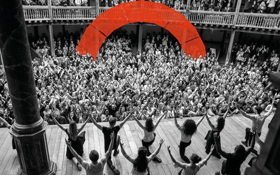Shakespeare's Globe Launches Podcast

Shakespeare's Globe is delighted to announce the launch today of Such Stuff, a brand new podcast. Such Stuff is hosted by Artistic Director, Michelle Terry, producer Imogen Greenberg and Head of Higher Education and Research, Dr. Farah Karim-Cooper.
The fortnightly episodes will be released on Thursdays and will cover the themes of the Globe's work, taking the listener behind-the-scenes, into rehearsal rooms, and onto the stage. The title of the podcast was drawn from the line "We are such stuff as dreams are made on" in The Tempest. Looking at Shakespeare's transformative impact on the world around us, Such Stuff will be split into summer and winter seasons, asking questions about programming, gender, race, social justice and their relationship to Shakespeare.
This is the latest step in the Globe's expanding digital content, which includes Globe Player, an online platform offering full-length HD films of over 50 Shakespeare productions at the Globe to rent or buy. The first two episodes of Such Stuff are available on iTunes, Apple Podcasts, Spotify, Stitcher, Pocket Casts and other major podcast platforms.
The episodes are thematic, including interviews, discussions and sneak peeks into all of the Globe's work. Episode 1 is entitled 'The Missing Women', and asks why is it so important to reclaim the untold stories of women from history? Emilia Bassano was a poet, writer, feminist and contemporary of Shakespeare, and until recently, her contribution to the literary canon was largely forgotten. Now she is the subject of a new play, Emilia, and the Emilias who appear throughout Shakespeare's work have underpinned the entire summer season. Such Stuff explores what we do and don't know about the real Emilia Bassano with Research Fellow Dr Will Tosh and goes behind-the-scenes with writer Morgan Lloyd Malcolm and director Nicole Charles. The podcast will also be taking a look at imbalances off of our stages, speaking to Emma Caplan of Band of Mothers about the missing women in our workforces. Finally, Kate Pankhurst, author of bestselling 'Fantastically Great Women Who Made History', discusses why young children need more stories of women from history.
Episode 2 is called Refugee Week and takes a look at the dedicated week the Globe took part in to ask 'how can art respond to the crises of our times?'. There are discussions with artists and theatre-makers who took part in this nationwide celebration of refugees. Writer Jude Christian and director Elayce Ismail discuss Nanjing, a monologue which reflects on pacifism and the responsibility of the individual from 1937 to the present. Jude tells her own family story, the story of the notorious Nanjing Massacre, and asks what each of us can do when atrocities occur across the world. Syrian Canadian visual artist and educator Dima Karout takes us behind the scenes of her Border Installation, explaining why she wanted to get audiences to participate and think about their own lives - and the lives of refugees - a little differently, and shares some of the incredible contributions left by our audiences. Finally, actors and refugees bring you The Strangers' Case, Shakespeare's cry for compassion for the plight of refugees.
Episode 3 is called The Ensemble Experiment, going behind-the-scenes with the Globe Ensemble. Director Federay Holmes and Research Fellow Dr Will Tosh explain the inspiration behind the ensemble, and how Shakespeare and the Lord Chamberlain's Men were radical before their time. They also discuss casting, gender swapping and giving actors parts they can really play. Actor Shubham Saraf discusses the rehearsal room and his role as Ophelia, and Michelle Terry sits down with Jack Laskey to talk Hamlet and Rosalind, and whether gender really plays a role in playing these roles.
Comments

Videos
